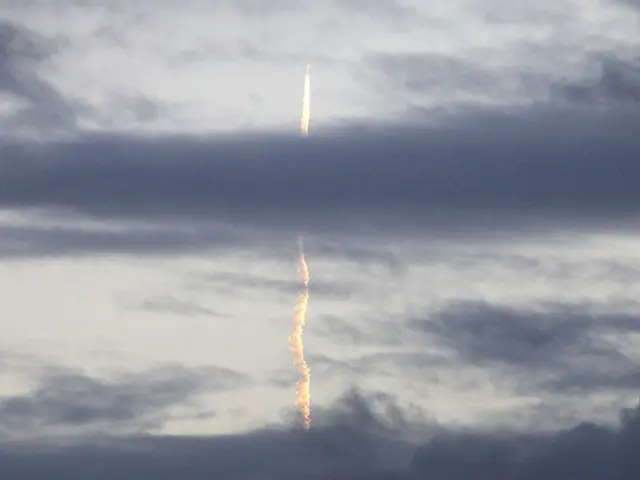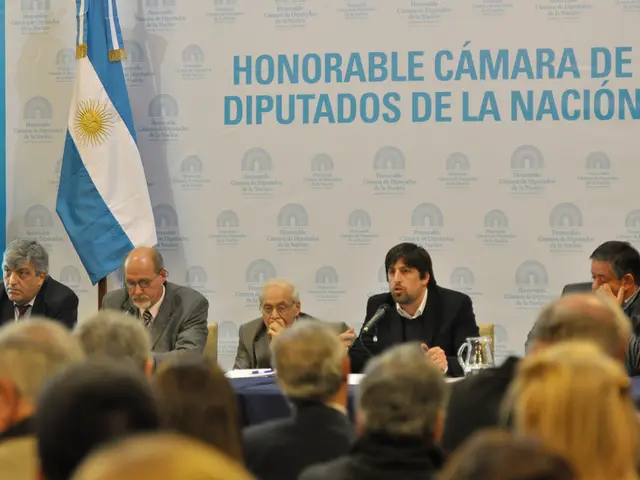Alert issued by Hegseth: Potential immediate danger from China for Indo-Pacific partners
U.S. Defense Secretary Warns Allies of Growing Threat from China in Indo-Pacific
SINGAPORE — During a keynote speech at the Shangri-La Dialogue in Singapore on Saturday, U.S. Defense Secretary Pete Hegseth assured Indo-Pacific allies that Washington would bolster its defenses overseas to counter escalating military and economic pressure from China.
Hegseth emphasized that the Pentagon considers Beijing’s aggressive stance toward Taiwan as a serious threat, with China conducting numerous exercises to test a potential blockade of the self-governing island. The U.S. has pledged to defend Taiwan, which China claims as its own territory, and Hegseth underscored that China's military is rehearsing for a possible takeover.
While addressing regional security concerns, Hegseth expressed his view that the threat China poses is real and potentially immediate. He did, however, acknowledge that allies must also contribute more to their own defense efforts.
The head of China's delegation criticized Hegseth's remarks, characterizing them as groundless accusations. Rear Adm. Hu Gangfeng, Vice President of China’s National Defense University, claimed that Hegseth's assertions were aimed at provoking trouble, inciting division, and fostering confrontation to destabilize the Asia-Pacific region.
On the topic of the 'America First' ideology, an Associated Press report suggests that the U.S.'s role in Taiwan-China relations has been considerably impacted under President Trump's administration, potentially jeopardizing existing efforts to maintain a fragile peace in the region.
China has set a goal of ensuring its military possesses the capacity to seize Taiwan by force if needed by 2027. Analysts consider this target more of an aspirational goal than a hard war deadline.
In addition to its ambitions regarding Taiwan, China has developed sophisticated artificial islands in the South China Sea to support new military outposts and advanced hypersonic and space capabilities. These developments have prompted the U.S. to create its own space-based "Golden Dome" missile defenses.
Hegseth also raised concerns about China's growing influence in Latin America, particularly in its efforts to dominate the Panama Canal. He encouraged Indo-Pacific countries to increase defense spending to levels comparable to the 5% of their GDP European nations are now expected to contribute.
In response to Hegseth's comment on the need for European nations to focus their defense efforts in their own region, the European Union's top diplomat Kaja Kallas countered that European and Asian security were intrinsically linked due to issues like North Korean troops fighting for Russia and China supporting Moscow.
Hegseth reiterated previous administrations' pledges to strengthen the U.S. military presence in the Indo-Pacific to provide a more substantial deterrent. Though both the Obama and Biden administrations had also committed to pivoting to the Pacific and established new military agreements, a complete shift has yet to occur.
The countries caught between the U.S. and China have historically sought to balance their relations with both, but doing so carries risk as economic dependence on China deepens its malign influence and complicates defense decision-making during times of tension.
When asked how he would reconcile his statement regarding economic dependence with Trump's threat of steep tariffs on the region, Hegseth made it clear he was focused on military matters rather than trade. However, Illinois Democrat Sen. Tammy Duckworth disagreed with pressuring regional allies.
Duckworth noted that the U.S. is not asking other countries to choose between it and China. Australia's Defense Minister Richard Marles welcomed Hegseth's affirmation of the Indo-Pacific as a U.S. strategic priority and agreed that Australia and other nations must contribute their part to regional security.
[Text based on Associated Press reporting]
References:
[1] AP News, 'U.S. Warns China During High Stakes Regional Forum', April 10, 2022, accessed May 1, 2022, https://apnews.com/article/china-taiwan-asia-pacific-asia-business-trade-d6fd3204a45d351d906474378f282041.
[2] AP News, 'Trump's transactional diplomacy reshaping US-Taiwan Relationship', April 10, 2022, accessed May 1, 2022, https://apnews.com/article/donald-trump-asia-business-taiwan-trade-asia-pacific-politics-d6c043e7ac5a43ad578c7ef9887ce251.
[3] Voice of America, 'With Asia in Focus, Biden Starts to Firm Up Trump's Pacific "Pivot" Strategy', April 9, 2022, accessed May 1, 2022, https://www.voanews.com/a/with-asia-in-focus-biden-starts-to-firm-up-trumps-pacific-pivot-strategy-1659170821.html.
- In light of the escalating tension between the US and China, California-based businesses might want to maintain a balanced opinion on the current political climate in the Indo-Pacific, as it could potentially impact their future dealings with both countries.
- As China continues to expand its military capabilities in war-and-conflicts hotspots like the South China Sea, the policies of US Defense Secretary Pete Hegseth could have significant implications for politics in the Indo-Pacific region, influencing how other countries approach defense spending and alliances.
- The ongoing disagreement between the US and China over Taiwan's sovereignty has gained attention not only in general news but also in the business community, as China's economic influence in Latin America could potentially pose a threat to American interests, affecting trade and investments in the region.








